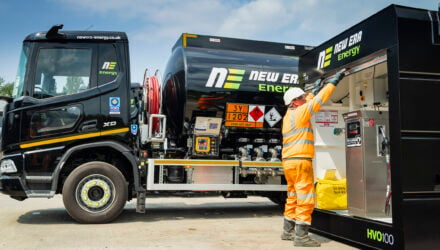
Ian Stone, CEO, Vuealta
Becoming more connected may be opening up fantastic new opportunities, but it is also exposing fleet managers to adverse events they previously wouldn’t have had to worry about. From extreme weather, to political and market uncertainty and cyber-attacks, it doesn’t matter where you are located, an event doesn’t have to be particularly big for to have serious consequences. The recent freak August weather in the UK for example, was cause for multiple road closures across the country and disruption across vital logistics operations.
It’s not just the primary impact that these events – natural or manmade – have on a singular fleet though, but the devasting cascading ripple effect throughout the entire chain.
The wider supply chain is becoming too big to handle
Many businesses in the UK are looking to grow and expand their supply chains, with 68% of respondents to a recent Vuealta survey saying they were looking to expand into new markets, meaning this kind of local disruption could have a much wider impact on a significantly larger supply chain. In fact, 49% of UK companies felt that Brexit uncertainty alone had negatively impacted their entire supply chain in the last five years.
But emerging economies and the complexity of modern logistics come with their own risks, that can ultimately impact operations closer to home. Interconnected, multi-layered and often unwieldly, the number of third parties that make up today’s modern supply chain is not only rapidly increasing, but can cover half the world. More than half (58%) of the organisations Vuealta spoke to had five or more companies in their supply chain, with 14% having more than 50.
It all adds up to more links which can be broken, more pieces which can be disabled and the potential for more disruption by outside forces. So, what can businesses do to protect themselves against these disruptive forces, whether they disrupt a singular UK fleet or another part of their global supply chain?
 Planning: the foundation for mitigating risk
Planning: the foundation for mitigating risk
To know what to do, it’s important to first be aware of where threats are going to come from. Aside from Brexit, disruption for UK operations was most likely to come from the failure of a single supplier (30%) or spikes in demand overstretching capacity (28%). Cyber-attacks (22%) and natural disasters (19%) were also likely to have disrupted supply chains in the last five years.
Each of those instances have both specific and more general solutions. Direct answers might include mitigating single supplier failure by having multiple sources for individual fleets to collect from, while investing in cyber security or having stockpiles would also be applicable where relevant. However, underpinning each of those is a need for clear planning, built upon transparency across the entire network and an understanding of how external threats could disrupt operations locally and globally.
This can only be achieved by what’s known as connected planning. This is where technology draws on data and established plans to enable this transparency across all parties within a supply chain and support logistics managers to make informed decisions, rapidly. By being able to access and collate critical data sources, businesses can reduce the impact of uncertainty and build realistic, actionable responses to all potential outcomes. As supply chains become more complex, it is only through connected planning that organisations can confidently expand into new markets with the visibility they need to respond to changes or disruption, as they arise.
Realising your goals with connected planning
Disasters happen. But the real test of any logistics operation is how quickly and decisively it can respond to ensure negative impact on other parts of the chain is kept to a minimum.
Preparing for and putting in place clear plans to combat these events can have a dramatic effect on mitigating both the short- and long-term impact. As part of this, being able to model what-ifs, use data to respond in real-time and have transparency across the logistics chain are all essential elements for any modern organisation to succeed.
If businesses in the UK want to realise their expansion ambitions, they need to have that ability to capture, analyse and action intelligence as quickly as possible. With huge opportunities to succeed for those that can get it right, taking a closer look at managing unexpected disruption is an essential step for any organisation operating in our complex world.
Author: Ian Stone, CEO, Vuealta







Jaimie
( Sunday, October 6, 2019 - 18:07 )
This article really emphasises the importance of preparation and planning! Not only is it cost-efficient, but it helps protect the reputation of your supply chain. Thanks for the post!